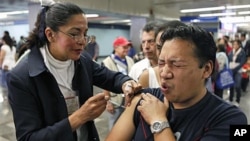In 2009, the H1N1 influenza pandemic was a major concern for public health officials worldwide. Now, a new study shows that steps taken by Mexican authorities were effective in limiting the spread of the so-called "swine flu."
Officials in Mexico ordered a range of actions designed to prevent new infections by keeping uninfected people away from those who had already caught the contagious H1N1 virus. Gerardo Chowell of Arizona State University said experts call this approach "social distancing."
"Actually Mexico implemented a nation-wide mandatory school closure policy... that affected all the school age children up to university students, all over Mexico."
The national school closures lasted 18 days. In Mexico City, even more restrictive regulations were imposed, including closing restaurants and cinemas, and canceling football matches and church services.
To see if these measures were effective, Chowell and his colleagues gathered data on documented influenza cases and others with flu-like symptoms. They then plugged those numbers into a mathematical model that predicts the extent of an outbreak without social distancing measures.
"We found that the measures were effective, that these measures were associated with a reduction in the transmission rate from 29 to 37 percent," he said.
That's consistent with a study of similar precautions taken in Hong Kong, where H1N1 transmission was reduced by an estimated 25 percent.
Chowell and his colleagues report their analysis of social distancing as an effective way to reduce the spread of influenza in the journal PLoS Medicine.
School Closures Significantly Reduced Mexican 'Swine Flu' Cases
- By Art Chimes
